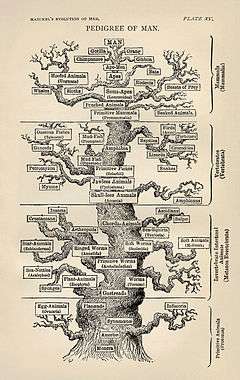Branches of botany
Botany is a natural science concerned with the study of plants. The main branches of botany (also referred to as "plant science") are commonly divided into three groups: core topics, concerned with the study of the fundamental natural phenomena and processes of plant life, the classification and description of plant diversity; applied topics which study the ways in which plants may be used for economic benefit in horticulture, agriculture and forestry; and organismic topics which focus on plant groups such as algae, mosses or flowering plants.
Core topics
- Cytology – cell structure, chromosome number
- Epigenetics – Control of gene expression
- Paleobotany – Study of fossil plants and plant evolution
- Palynology – Pollen and spores
- Plant biochemistry – Chemical processes of primary and secondary metabolism
- Phenology – timing of germination, flowering and fruiting
- Phytochemistry – Plant secondary chemistry and chemical processes
- Phytogeography – Plant Biogeography, the study of plant distributions
- Phytosociology – Plant communities and interactions
- Plant anatomy – Structure of plant cells and tissues
- Plant ecology – Role and function of plants in the environment
- Plant evolutionary developmental biology – Plant development from an evolutionary perspective
- Plant genetics – Genetic inheritance in plants
- Plant morphology – Structure of plants
- Plant physiology – Life functions of plants
- Plant reproduction – Processes of plant reproduction
- Plant systematics – Classification and naming of plants
- Plant taxonomy – Classification and naming of plants
Applied topics
- Agronomy – Application of plant science to crop production
- Arboriculture – Culture and propagation of trees
- Biotechnology – Use of plants to synthesize products
- Dendrology – Study of woody plants, shrubs, trees and lianas
- Economic botany – Study of plants of economic use or value
- Ethnobotany – Plants and people. Use and selection of plants by humans
- Forestry – Forest management and related studies
- Horticulture – cultivation of garden plants
- Marine botany – Study of aquatic plants and algae that live in seawater
- Micropropagation – rapid propagation of plants using cell and tissue culture
- Pharming (genetics) – Genetic engineering of plants to produce pharmaceuticals
- Plant breeding – Breeding of plants with desirable genetic characters
- Plant pathology (Phytopathology) – Plant diseases
- Plant propagation – propagation of plants from seed, bulbs, tubers, cuttings and grafting
- Pomology – Fruit and nuts
Organismal topics
- Agrostology – Grasses
- Batology – Brambles
- Bryology[1] – Mosses, liverworts, and hornworts
- Lichenology – Lichens
- Mycology, or fungology – Fungi
- Orchidology – Orchids
- Phycology,[2] or algology – Algae
- Pteridology – Fern and their allies
- Rhodology – Roses
- Synantherology – Compositae
References
- ↑ British Bryological Society
- ↑ Harvey, William Henry. 1849. A Manual of the British Marine Algae... John van Voorst, London
This article is issued from Wikipedia - version of the 9/11/2016. The text is available under the Creative Commons Attribution/Share Alike but additional terms may apply for the media files.


